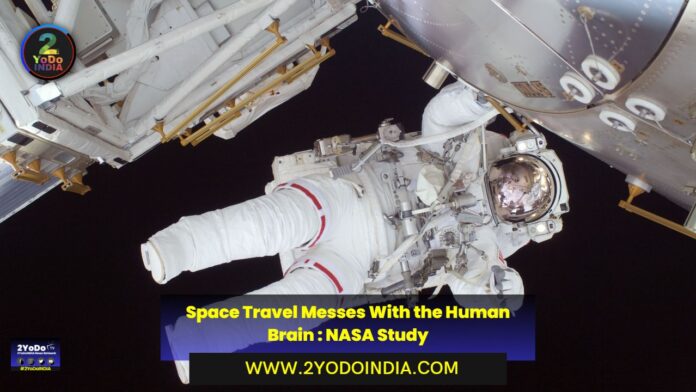Space can be an unfriendly place for the human body, with microgravity conditions and other factors tampering with our physiology, from head to toe, head, of course, being a primary concern.
As per new NASA-funded study provides a deeper understanding of the issue.
Researchers said that astronauts who travel on the International Space Station (ISS) or NASA space shuttles on missions lasting at least six months experience significant expansion of the cerebral ventricles, spaces in the middle of the brain containing cerebrospinal fluid.
This colorless and watery fluid flows in and around the brain and spinal cord.
It cushions the brain to help protect against sudden impact and removes waste products.
Researchers found that it took three years for the ventricles to fully recover after such journeys based on brain scans of 30 astronauts, suggesting that an interval of at least that duration would be advisable between longer space missions.
University of Florida neuroscientist Heather McGregor, lead author of the study published in the journal Scientific Reports, said :
“If the ventricles don’t have sufficient time to recover between back-to-back missions, this may impact the brain’s ability to cope with fluid shifts in microgravity. For example, if the ventricles are already enlarged from a previous mission, they may be less compliant and/or have less space to expand and accommodate fluid shifts during the next mission,”.
Age-related ventricular enlargement cause not by microgravity but by brain atrophy can be associate with cognitive decline.
University of Florida applied physiology and kinesiology professor and study senior author Rachael Seidler said :
“The impact of ventricular expansion in space travelers is not currently known. More long-term health follow-up is needed. This ventricular expansion likely compresses the surrounding brain tissue,”.
The absence of Earth’s gravity modifies the brain.
Rachael Seidler said :
“This seems to be a mechanical effect,”
“On Earth, our vascular systems have valves that prevent all of our fluids from pooling at our feet due to gravity. In microgravity, the opposite occurs, fluids shift toward the head. This headward fluid shift likely results in ventricular expansion, and the brain sits higher within the skull.”
The study involve 23 male and 7 female astronauts, average age around 47 from the US, Canadian and European space agencies.
Eight travel on space shuttle missions of about two weeks.
Eighteen were on ISS missions of about six months and four on ISS missions of about a year.
Little to no ventricular volume change occurred in astronauts after short missions.
Enlargement occur in astronauts after missions of six months or longer, though there was no difference in those who flew for six months compare to those who did so for a year.
Heather McGregor said :
“This suggests that the majority of ventricle enlargement happens during the first six months in space, then begins to taper off around the one-year mark,”.
The fact that enlargement did not worsen after six months could be good news for future Mars missions on which astronauts may spend two years in microgravity during the journey.
Heather McGregor said :
“This preliminary finding is promising for astronaut brain health during long-duration missions, but it’s still important that we examine MRI data from a larger group of astronauts and following even longer missions,”.
The absence of enlargement following short flights was good news for people who may consider short space tourism jaunts, Rachael Seidler said, as that industry develops.
Microgravity conditions also cause other physiological effects due to the reduce physical load on the human body.
These include bone and muscle atrophy, cardiovascular changes, issues with the balance system in the inner ear and a syndrome involving the eyes.
Elevated cancer risk from the greater exposure to solar radiation that astronauts may encounter the further they travel from Earth is another concern.





